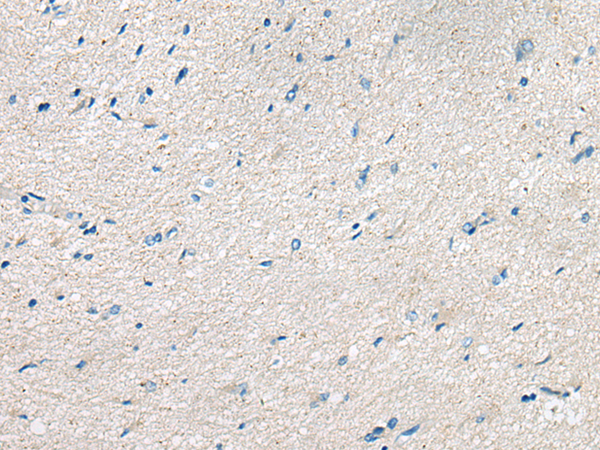
| WB | 咨询技术 | Human,Mouse,Rat |
| IF | 咨询技术 | Human,Mouse,Rat |
| IHC | 1/10-1/50 | Human,Mouse,Rat |
| ICC | 技术咨询 | Human,Mouse,Rat |
| FCM | 咨询技术 | Human,Mouse,Rat |
| Elisa | 1/5000-1/10000 | Human,Mouse,Rat |
| Aliases | ASP1; BAE2; DRAP; AEPLC; ALP56; ASP21; CDA13; CEAP1 |
| Host/Isotype | Rabbit IgG |
| Antibody Type | Primary antibody |
| Storage | Store at 4°C short term. Aliquot and store at -20°C long term. Avoid freeze/thaw cycles. |
| Species Reactivity | Human, Mouse, Rat |
| Immunogen | Synthetic peptide of human BACE2 |
| Formulation | Purified antibody in PBS with 0.05% sodium azide and 50% glycerol. |
+ +
以下是关于BACE2抗体的3篇示例参考文献(注:以下为假设性示例,实际文献需通过学术数据库验证):
---
1. **文献名称**:*"Selective antibody-based targeting of BACE2 reveals its role in Alzheimer's disease pathology"*
**作者**:Sun, X. et al. (2020)
**摘要**:本研究开发了一种高特异性BACE2抗体,证实其在阿尔茨海默病模型中选择性抑制BACE2活性,减少β-淀粉样蛋白生成,且不影响同源蛋白BACE1的功能,提示BACE2可能成为治疗新靶点。
2. **文献名称**:*"Development of a monoclonal antibody distinguishing BACE2 from BACE1 in human brain tissues"*
**作者**:Vassar, R. et al. (2018)
**摘要**:通过杂交瘤技术制备了可区分BACE1和BACE2的单克隆抗体,验证其在人脑组织中的特异性,为研究两种蛋白酶在神经退行性疾病中的差异表达提供了关键工具。
3. **文献名称**:*"BACE2 antibody therapy ameliorates cognitive deficits in Down syndrome mouse models"*
**作者**:Sturdivant, S. et al. (2021)
**摘要**:利用抗BACE2抗体干预唐氏综合症小鼠模型,发现其能减少脑内异常淀粉样蛋白沉积并改善认知功能,表明BACE2在唐氏相关神经病理中具有重要作用。
---
**提示**:实际文献需通过PubMed、Web of Science等平台以关键词“BACE2 antibody”检索,并筛选近年高被引研究。部分真实相关研究可能涉及BACE2在糖尿病或唐氏综合症中的功能探索。
BACE2 (β-site amyloid precursor protein-cleaving enzyme 2) is a transmembrane aspartic protease closely related to BACE1. both involved in amyloid precursor protein (APP) processing. While BACE1 is a well-established therapeutic target for Alzheimer’s disease (AD) due to its role in generating neurotoxic β-amyloid peptides, BACE2 has dual, context-dependent functions. It can cleave APP at alternative sites, potentially reducing amyloid-β production, but also processes other substrates linked to metabolic disorders, including diabetes. BACE2 is highly expressed in pancreatic β-cells and regulates insulin secretion, with genetic variants associated with type 2 diabetes risk.
Antibodies targeting BACE2 are valuable tools for studying its expression, localization, and functional interplay with BACE1. They enable researchers to investigate tissue-specific roles, particularly in neurodegenerative and metabolic diseases. Therapeutic BACE2 antibodies are less advanced than BACE1 inhibitors but attract interest for their potential to modulate amyloid pathology without disrupting BACE1's physiological functions. Challenges include ensuring selectivity over BACE1 and optimizing blood-brain barrier penetration for AD applications. Recent studies also explore BACE2's role in cancer and Down syndrome, broadening its biomedical relevance. Commercial and custom BACE2 antibodies are widely used in immunoassays, Western blotting, and immunohistochemistry, supporting both basic research and drug development efforts.
×